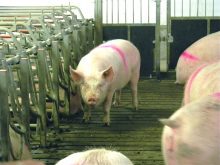Biofuels and the fledgling bioproducts industry continue to provide an important economic opportunity for farmers despite troubles the industry has experienced in the past year, says Gordon Quaiattini, president of the Canadian Renewable Fuels Association.
A recent report from the International Energy Agency should clear up charges biofuels are a greater source of greenhouse gases than petroleum and that they contributed to last year’s surge in farm commodity prices, he told the Commons agriculture committee April 30.
“Renewable fuels are now and in the coming years a story of new economic opportunity for Canadian farmers and rural Canada,” he said. They are “creating new markets for agriculture producers, revitalizing communities, reducing harmful greenhouse gases, and offering consumers new choice at the pump.”
Read Also

Mazergroup’s Bob Mazer dies
Mazergroup’s Bob Mazer, who helped grow his family’s company into a string of farm equipment dealerships and the main dealer for New Holland machinery in Saskatchewan and Manitoba, died July 6 from cancer.
Producing ethanol from corn and wheat and biodiesel from canola are just the first steps for the bioproducts industry, he said. Next will come biofuels made from non-food feedstock such as agriculture biomass, waste materials, and algae.
From this starting point, “the full potential of the bioeconomy will be plain to see – as all kinds of biomass grown and harvested will also be the feedstock for plastics, chemicals, pharmaceuticals, and many other materials,” he noted. “New jobs will be created, industrial policy will adapt, and agriculture can again become a truly growth industry.”
Right now the biofuel industry is growing to meet federal requirements for five per cent ethanol and two per cent biodiesel and home heating oil by 2010. Even if the fuel industry doesn’t grow beyond that, it will require 240 million bushels of domestic oilseeds and grains, he said.
That “will help keep commodity prices at a fair level, thus lowering government support payments and assist in making more farms across Canada financially viable again.”
Jeff Passmore, executive vice-president of Iogen, the Ottawa-based company trying to achieve commercial cellulosic ethanol production from straw, said the industry will remain dependent on government support until the technology becomes attractive to private sector investment.
The USDA has calculated that the demand for biofuels added only four per cent to the rise in food prices in the United States last year. And that even with food, feed and fuel uses, there is a significant corn surplus.
One question MPs from all parties posed was why the move to next-generation biofuels is taking so long. Passmore and Tim Haig, CEO of Biox Corporation, a Hamiltonbased manufacturer of biodiesel from rendered animal fats, said making the technology work at commercial levels is taking longer than hoped for both in Canada and overseas.
Biox is conducting research into making biodiesel, from algae beds which might also serve as a way to make coal burn cleaner, he said.


















